The Electronic Intifada 16 January 2020
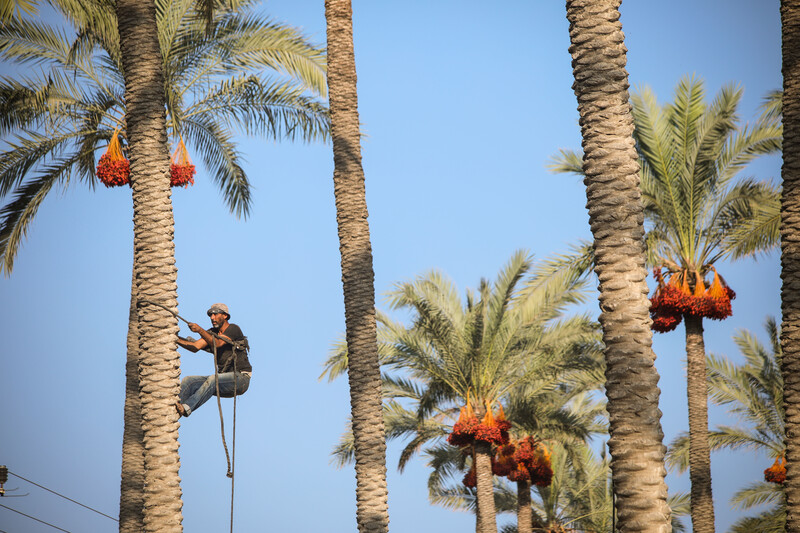
Ahmad Abu Amira, 40, checked a twisted rope wound around a palm tree in the Deir al-Balah area of central Gaza.
He looked up and began to climb. High above, a cluster of blood-red dates hung heavy and ripe.
Gaza’s date harvest started in December, and Abu Amira was looking forward to a bumper crop. Though a tailor of 20 years experience, Gaza’s stagnant economy has seen him unemployed these past five years.
The annual date harvest is a ritual he has enjoyed for many years, even before he lost work by the sewing machine. The tradition – just like the olive harvest – is passed down through the generations and sees families and young people gather to help farmers collect their harvest.

Abu Amira learned the date picking secrets from his father, Hamid, who died 15 years ago.
Like many others, Abu Amira harvests the fruit as a professional sideline. He works in effect as a contractor: plantation owners will hire him to gather a group of workers and collect the dates.
“This is a big season. I hired 30 workers this year,” he told The Electronic Intifada.
But though the harvest looks good, Gaza’s economic outlook is disastrous.
Israel’s draconian blockade on Gaza’s 2 million people has lasted 12 years. But restrictions on the passage of goods and people began well before Hamas ousted Fatah from Gaza in 2007.

There has been some easing on the passage of goods out of Gaza in recent years, but it falls far below a level that can impact positively on Gaza’s economy. It falls far below even levels previously agreed on in the 2005 US-sponsored Agreement on Movement and Access, which Israel never adhered to.
Without an easing of this blockade, the UN has already warned that the 2 million Palestinians in Gaza will face a humanitarian disaster that could leave Gaza uninhabitable in 2020.
Export or none, the date harvest will continue. It is a hard, time-honored graft and one that brings obvious pleasure to those engaged in it.
It is also a practice that goes back millennia. Indeed, parts of Palestine were known to ancient Romans and Greeks as the “land of the date,” according to some historians.
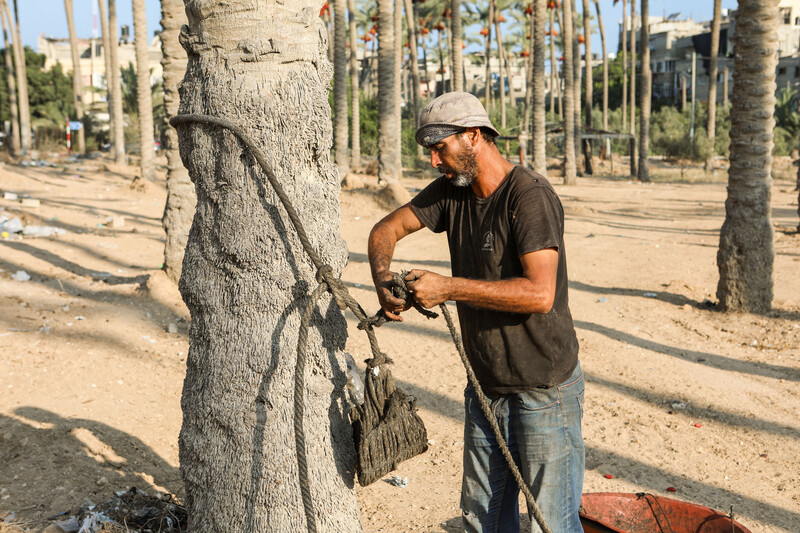
Abu Amira checks the rope one more time. The rope supports one person, who climbs to the top, plucks bunches of dates and drops into the nets of other workers below.
An opportunity lost
Gaza harvested more than 12,000 tons of dates in 2019, according to Nizar al-Wahidi of the local agriculture ministry. It is a harvest, he said, large enough to cover both local needs and with sufficient to spare for export.
The coastal strip boasts more than 230,000 palm trees, al-Wahidi said, of which some 160,000 produce dates of the hayani type, a local variant able to survive in Gaza’s hot, dry climate and flourish despite the salinity of the water.
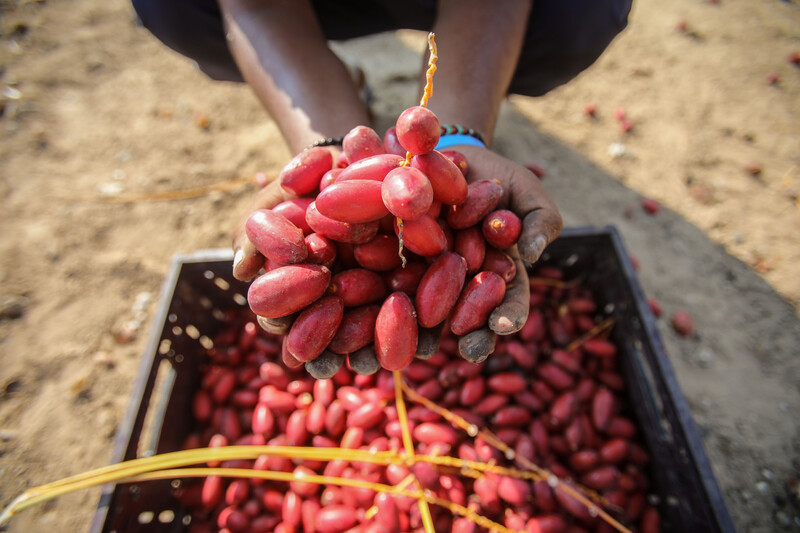
It is known for its sweetness and succulence and is used to make molasses, jam and dried dates.
Ahmad Samour, 55, owns 10 acres of palm trees in Deir Al-Balah. But the last time he could export to the West Bank, he told The Electronic Intifada, was in 2015.
Since 2016, he hasn’t been allowed to export a single fruit, including this past year.
However, he is happy at the abundant harvest as well as the opportunity to provide employment, even if temporary, for some 20 young people.
One of these, Ahmad Abu Tabaq, 28, has been doing the rounds in Gaza. Before Samour hired him, Tabaq had been looking to work as a builder.
Before that, he was a mechanic. He has gone where the work is.
But he is enjoying his time in the fields.
“I had been waiting to work hard this year and it’s beautiful to do so in this traditional trade among the trees.”
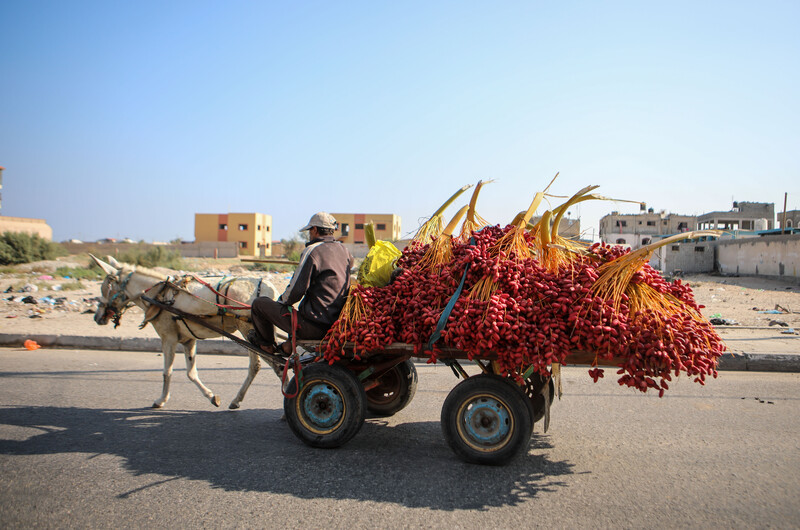
Tabaq is hoping to buy some toys for his children and bring some dates home.
Like him, Muhammad Adel, 26, another of Samour’s temporary hires, also hopes to have some extra cash to spend. He needs a new phone.
Adel is a carpenter but like Tabaq, cannot find work in his trade. And also like Tabaq, Adel finds that picking dates brings its own compensation.
“This is the fourth season I work in the harvest. I love it. I love the ritual. I love the dates and the fresh air. I forget all my fatigue while picking,” Adel said.
Ahmad al-Bassiouni, a spokesperson for the agriculture ministry, said that while the harvest has been good, as long as farmers are banned from exporting, there is little chance of development in the sector.
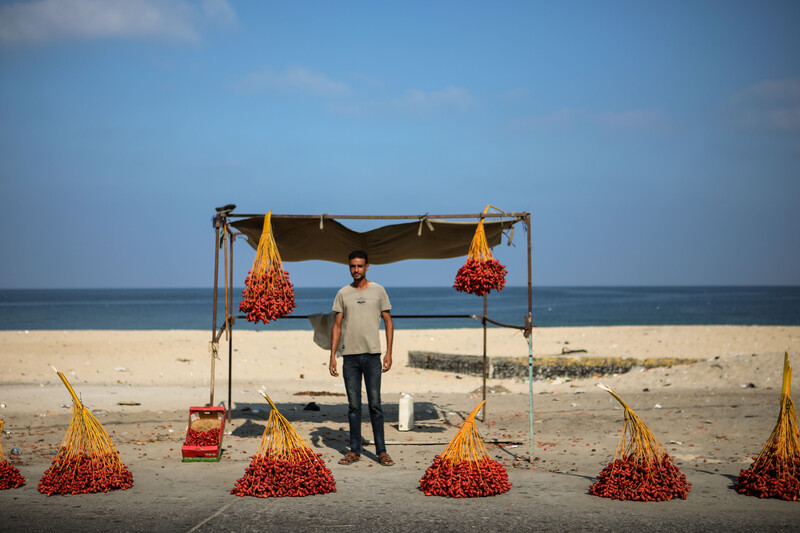
He also worried that if the siege on Gaza continues much longer, it could lead farmers to abandon their trade and seek work elsewhere.
There has been a decline in international support for development projects generally over the past three years, he said, including in the agriculture sector, and some farmers had already sold their land to seek opportunity in other industries.
“It is a difficult time for farmers in Gaza,” al-Bassiouni told The Electronic Intifada. “They cannot market their products in the West Bank because of the occupation. This kills any hope farmers have to make decent money and develop their farms.”
Amjad Ayman Yaghi is a journalist based in Gaza.
Mohammed Al-Hajjar is a photographer based in Gaza.


